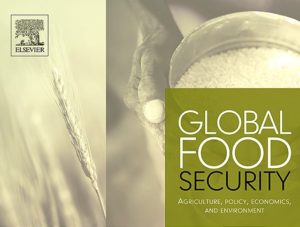Newsletter ![]() Issue #5
Issue #5 ![]() October 2020
October 2020
- Editorial
- The insurance sector and COVID-19
- Agricultural insurance from an Asian perspective
- The BEACON Lighthouse Customers
- Best practices for subsidizing agricultural insurance
- Upcoming events
- In case you missed
- Join us
Editorial
Hurray! The BEACON 5th newsletter is out!
![]() How was the insurance sector affected by COVID-19?
How was the insurance sector affected by COVID-19?
![]() What’s the Asian perspective in Agricultural insurance?
What’s the Asian perspective in Agricultural insurance?
![]() Who are the new BEACON Lighthouse Customers?
Who are the new BEACON Lighthouse Customers?
![]() What are the challenges in subsidizing agricultural insurance?
What are the challenges in subsidizing agricultural insurance?
![]() What’s new in Beacon?
What’s new in Beacon?
Get the answers to these questions in our 5th e-newsletter edition!
Follow us and stay informed on the latest project developments!
The insurance sector and COVID-19
 The current COVID-19 pandemic has already disrupted production and marketing of agricultural goods all around the world. These disruptions have affected all scales and markets of agriculture, and the farmers with crop insurance have faced with a series of specific challenges (e.g. unable to obtain labor for harvest). Additionally, COVID-19 has also changed the daily operations of the insurance companies and adaptations need to be made, for instance, regarding on-the-spot inspections and payments.
The current COVID-19 pandemic has already disrupted production and marketing of agricultural goods all around the world. These disruptions have affected all scales and markets of agriculture, and the farmers with crop insurance have faced with a series of specific challenges (e.g. unable to obtain labor for harvest). Additionally, COVID-19 has also changed the daily operations of the insurance companies and adaptations need to be made, for instance, regarding on-the-spot inspections and payments.
Agricultural insurance from an Asian perspective
The BEACON Lighthouse Customers (LHC)
The enhancement and empowerment of the LHC Group is a constant procedure for the BEACON project in order to maximise the visibility and relevance of the outcomes achieved within the project. The BEACON LHC Group list has been updated with 3 more members and a brief description of their activities/organization follows.
Agrisk – crop insurance broker (Hungary) ![]()
 Agrisk is an insurance-independent service representing farmers from Kalocsa, Hungary. The main goal of Agrisk is to provide farmers with the highest quality of Agricultural Insurance (AgI) consulting services and it is collaborating with 4 major Hungarian agri-insurance companies: Allianz, Agrar, Biztosito, Generali Hungary and Groupama.
Agrisk is an insurance-independent service representing farmers from Kalocsa, Hungary. The main goal of Agrisk is to provide farmers with the highest quality of Agricultural Insurance (AgI) consulting services and it is collaborating with 4 major Hungarian agri-insurance companies: Allianz, Agrar, Biztosito, Generali Hungary and Groupama.
Halk Osiguruvanje A.D. (Skopje, North Macedonia) ![]()
 Halk Insurance A.D. is a North Macedonia nonlife insurance company and it’s a part of Halk Bank Turkey which is one of the largest banks in the Turkish banking market. The main expertise of the company is based on nonlife insurance with the highest percentage of sales being based on motor vehicle insurance and property insurance. Sales of crop policies also play a major role in achieving their goals and the most insured agricultural products are apples, plums, grapeσ, cherries, aronia berry and cereal plants.
Halk Insurance A.D. is a North Macedonia nonlife insurance company and it’s a part of Halk Bank Turkey which is one of the largest banks in the Turkish banking market. The main expertise of the company is based on nonlife insurance with the highest percentage of sales being based on motor vehicle insurance and property insurance. Sales of crop policies also play a major role in achieving their goals and the most insured agricultural products are apples, plums, grapeσ, cherries, aronia berry and cereal plants.
 Genillard & Co offers coverage concepts for specialty risks in the insurance and reinsurance market. Over the last 15 years, Genillard & Co has evolved as a service provider for broking and consulting in the insurance industry. Genillard & Co is able to evaluate the AgI product portfolio and advice for future needs and developments. Furthermore, they have expertise in the area of index insurance products and offer the service of delivering insurance schemes for drought.
Genillard & Co offers coverage concepts for specialty risks in the insurance and reinsurance market. Over the last 15 years, Genillard & Co has evolved as a service provider for broking and consulting in the insurance industry. Genillard & Co is able to evaluate the AgI product portfolio and advice for future needs and developments. Furthermore, they have expertise in the area of index insurance products and offer the service of delivering insurance schemes for drought.
In the following months the BEACON team will continue its engagement and reach out activities with pending and new potential actors, to participate in the Lighthouse Customers group. More actors will be approached and engaged to participate in the BEACON Lighthouse Customers group that is growing beyond the initially defined KPI.
In parallel, LHC BEACON training sessions, BEACON toolbox presentations and early pilot results will be used as living examples of toolbox readiness and offered capabilities.
Best practices for subsidizing agricultural insurance
Many governments subsidize agricultural insurance for farmers. There are several reasons behind these subsidies, some having to do with market failures that constrain the development of private insurance markets, and some having more overt political and social objectives.
While there would appear to be many contexts in which subsidized agricultural insurance has the potential to offer attractive benefits, experience shows that once introduced, well known challenges with the design and operation of agricultural insurance programs, poor design of subsidies, plus political dynamics can all contribute to disappointing results, an expensive draw on government budgets, and the creation of disincentive problems that lead to significant economic costs and inefficiencies, and in some circumstances, to environmental degradation.
To avoid these problems, any insurance subsidy needs to be carefully designed to be “smart”, in the sense that it is cost effective in achieving its underlying purpose, minimizes disincentive problems, and does not become a growing financial burden on the government. Also, before subsidizing insurance, governments should first ensure that the basic public goods needed to create an enabling environment for insurance are in place, without which insurance markets cannot be expected to work well nor subsidies to achieve their intended purposes.
 The paper “Best practices for subsidizing agricultural insurance” by Peter Hazell and Panos Varangis (Global Food Security, Volume 25, June 2020) discusses these issues and proposes some best practice guidelines for the design and implementation of subsidized agricultural insurance.
The paper “Best practices for subsidizing agricultural insurance” by Peter Hazell and Panos Varangis (Global Food Security, Volume 25, June 2020) discusses these issues and proposes some best practice guidelines for the design and implementation of subsidized agricultural insurance.
Particularly the paper highlights that:
- Agricultural insurance is subsidized in many countries, at a global cost to governments of well over $20 billion each year.
- There are several reasons for this expenditure, but very little is really known about the effectiveness of insurance subsidies in achieving their intended purposes or in justifying their costs.
- Much more is known about the problems that arise when subsidies are channeled through badly run insurance programs or are poorly designed.
- "Smart” subsidies are cost effective in achieving its underlying purpose, they minimize disincentive problems, and avoid becoming a growing financial burden on the government.
- Before subsidizing insurance, governments should first ensure that the basic public goods needed to create an enabling environment for insurance are in place.
Upcoming events

![]() Innovators Insurance Summit
Innovators Insurance Summit
![]() November 18-19, 2020
November 18-19, 2020
![]() London, UK
London, UK
![]() Website
Website
Insurance Innovators Summit is the event where the very best of the insurance industry comes together from across the globe for two jam-packed days to challenge the traditional world of insurance. Topics discussed are customer centricity, marketing and CX, digital transformation, what’s next for innovation, insurtech strategy, IoT, product innovation, and more.

![]() ICARRM 2021: International Conference on Agricultural Risks and Risk Management
ICARRM 2021: International Conference on Agricultural Risks and Risk Management
![]() January 28-29, 2021
January 28-29, 2021
![]() Dubai, United Arab Emirates
Dubai, United Arab Emirates
![]() Website
Website
International Conference on Agricultural Risks and Risk Management is the premier interdisciplinary forum for the presentation of new advances and research results in the fields of Agricultural Risks and Risk Management. The conference will bring together leading academic scientists, researchers and scholars in the domain of interest from around the world.

![]() The 3rd International Conference on Blockchain Technology
The 3rd International Conference on Blockchain Technology
![]() March 26-28, 2021
March 26-28, 2021
![]() Shanghai, China
Shanghai, China
![]() Website
Website
Blockchain technology has infiltrated all areas of our lives, from manufacturing to healthcare and beyond, such as the Internet of Things (IoT), Agriculture, Government, Manufacturing, Travel and Transportation, Supply-Chain, etc. The goal of this conference is to promote community-wide discussion identifying the advanced applications, technologies and theories for blockchain.
In case you missed
Join us
Do you want to stay up to date with all the latest BEACON news?
Do you have any questions or would like to get in touch with us to share your insights, feedback or opinions?
Sign up to our mailing list...
Follow us on social media...

